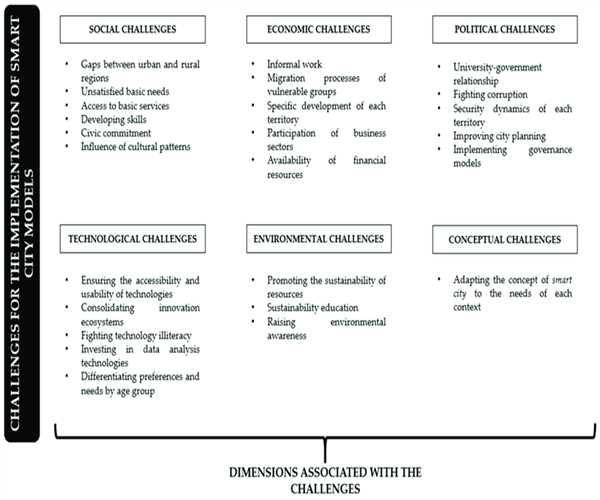Implementing smart city technologies is a complex endeavor that presents several challenges. While the potential benefits of these technologies are substantial, addressing the following challenges is crucial for successful implementation:
Cost and Funding: Smart city initiatives require significant investment in infrastructure, technology deployment, and maintenance. Securing funding for large-scale projects can be challenging, especially for municipalities with limited financial resources. Public-private partnerships, grants, and innovative financing models may be necessary to overcome this hurdle.

Interoperability and Integration: Smart city technologies encompass a wide range of systems and devices, often provided by different vendors. Ensuring interoperability and seamless integration between these diverse components is crucial for efficient data sharing and collaboration. Standards, protocols, and open data platforms are needed to facilitate interoperability and prevent vendor lock-in.
Privacy and Security: As smart city technologies collect vast amounts of data, concerns about privacy and security arise. Safeguarding personal information and ensuring secure data transmission and storage are critical. Robust cybersecurity measures, data anonymization, and transparent privacy policies are essential to address these concerns and build public trust.
Digital Divide: Unequal access to technology and the digital divide pose challenges in implementing smart city initiatives. Ensuring equitable access to digital infrastructure, internet connectivity, and devices is crucial to prevent exacerbating social inequalities. Efforts should be made to bridge the digital divide and provide equal opportunities for all citizens to benefit from smart city technologies.
Governance and Policy Frameworks: Implementing smart city technologies requires appropriate governance structures and policy frameworks. Clear regulations and guidelines must be in place to address issues such as data ownership, privacy protection, data sharing, and citizen engagement. Collaboration between government agencies, private sector partners, and community stakeholders is necessary to develop effective governance models.
Citizen Engagement and Participation: Engaging citizens in the smart city planning and decision-making process is crucial for successful implementation. Lack of awareness, limited digital literacy, and skepticism can hinder citizen participation. Efforts should be made to educate and involve citizens, address their concerns, and ensure that their needs and feedback are considered in the planning and implementation stages.
Legacy Infrastructure and Retrofitting: Many cities have existing infrastructure that may not be compatible with smart technologies. Retrofitting old infrastructure to accommodate new sensors, communication networks, and data collection systems can be a challenge. Retrofitting efforts require careful planning, coordination, and investment to minimize disruptions and optimize the integration of smart technologies.
Data Management and Analytics: Smart city technologies generate vast amounts of data. Effective data management, storage, analysis, and utilization are critical to derive actionable insights and make informed decisions. Developing data governance frameworks, establishing data sharing protocols, and implementing advanced analytics capabilities are necessary for harnessing the full potential of smart city data.
Addressing these challenges requires collaboration, strategic planning, and a long-term vision. Successful implementation of smart city technologies requires a holistic approach that considers technological, social, economic, and environmental aspects to create sustainable and inclusive cities of the future.